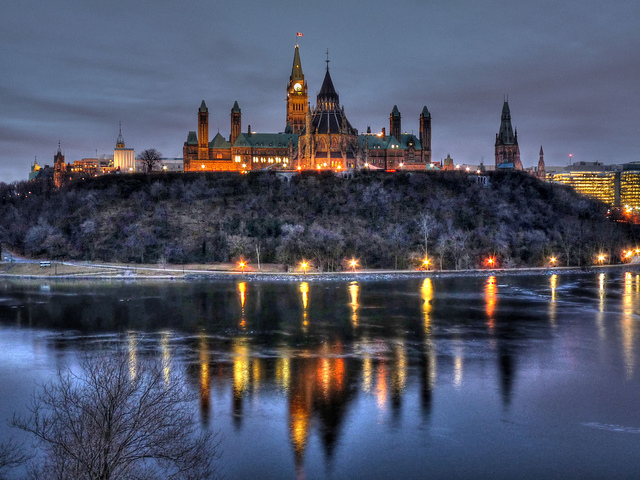Ottawa residents came out Tuesday to hear about the threats that would be posed to waterways by the 1.1 million barrel-per-day Energy East Pipeline.
The Council of Canadians and Ecology Ottawa co-hosted an evening town hall at the Ottawa Public Library to explore the impact Energy East tar sands pipeline may have on water, particularly the impact a spill would have on the Rideau, Mississippi and Ottawa rivers.
The town hall focused on the newly released report from Montreal-based technical firm Savaria Experts-Conseils.
Daniel Cayley-Daoust, Council of Canadians energy campaigner, highlighted the 30-page technical report commissioned by the council and Ecology Ottawa, which found that a spill from the pipeline would have catastrophic and costly consequences and put the region’s drinking water at risk.
The report said that a spill in the Rideau River would impact Ottawa and Gatineau’s drinking water within 48 hours and a spill in the Mississippi River would impact the drinking water for surrounding cities after about 60 hours.
Algonquin Elder Claudette Commanda welcomed the town hall members to unceded and unsurrendered Algonquin territory. She told the audience that hope is free and that it’s important to be hopeful and to take care of Mother Earth.
Verna McGregor from Kitigan Zibi Anishinabeg First Nation said that rivers are the bloodlines of Mother Earth and if they were blocked, Mother Earth would be hurt – similar to if a person’s circulation were to be impeded.
She told the audience about the resistance, several years ago, against a proposed uranium mine on unceded territory near Sharbot Lake.
Queen’s University professor Robert Lovelace was sentenced to six months in jail in 2008 for refusing to obey an injunction against protesting at the mine site. McGregor said there are times when this type of courage and sacrifice is needed to protect water.
Erica Violet Lee, an Indigenous feminist and community organizer from Treaty 6 territory in Saskatchewan, talked about her experience at the World Climate Change Conference 2015 (COP21). She said she knew that real climate action wasn’t going to come out of that forum.
She received warm applause from the audience when she told the story of her sticking out her tongue when standing near Saskatchewan Premier Brad Wall in Paris. She also talked about the 1,572 barrel Husky oil spill in the North Saskatchewan River this summer.
Council of Canadians chairperson Maude Barlow closed the evening by highlighting the global water crisis. She said that 3.9 billion people could be living in areas affected by severe water stress by 2030.
She said there is also a water crisis here in Canada, as told in her new book, Boiling Point: Government Neglect, Corporate Abuse, and Canada’s Water Crisis.
Barlow said that the federal Liberals appear to be backtracking on their election pledge to restore and enhance the Navigable Waters Protection Act because the oil industry doesn’t want those protections back in place for the 31,000 lakes and 2.25 million rivers now without federal oversight.
In a letter to the editor in the Ottawa Citizen, Nancy Biggs wrote, “Data from other catastrophic spills show it has taken from eight hours to two weeks to notice and react to spills. In July, it took 14 hours to shut down the valves in the North Saskatchewan River Husky oil spill. Is it worth the risk to our drinking water and our economy and way of life? Just say no to the Energy East Pipeline and protect our rivers at no extra cost.”
For more on our campaign to stop the Energy East pipeline, please click here.
Like this article? rabble is reader-supported journalism. Chip in to keep stories like these coming.




